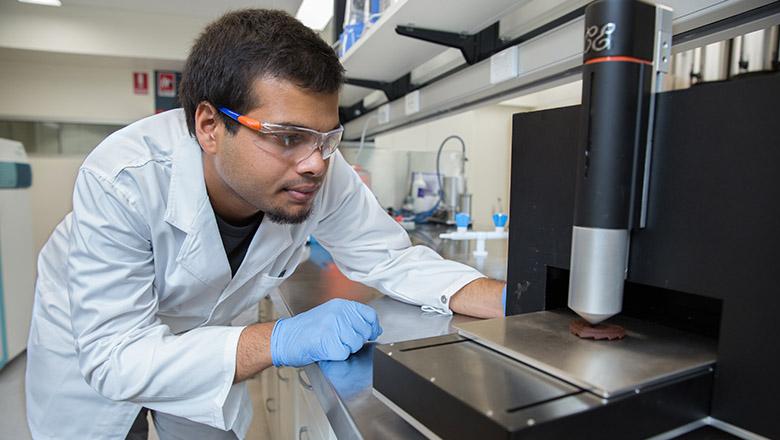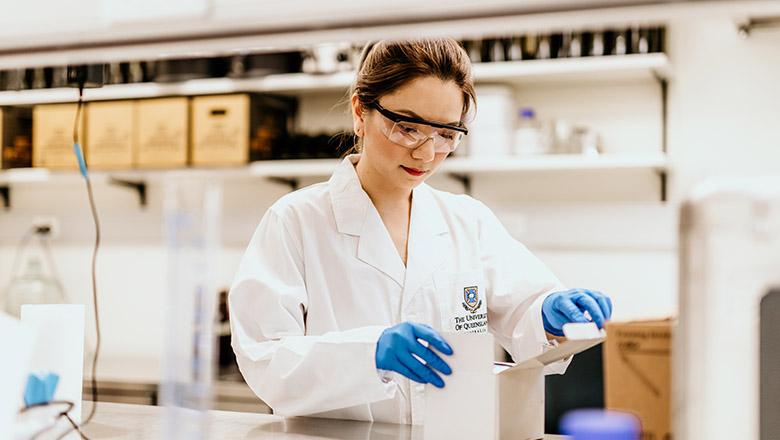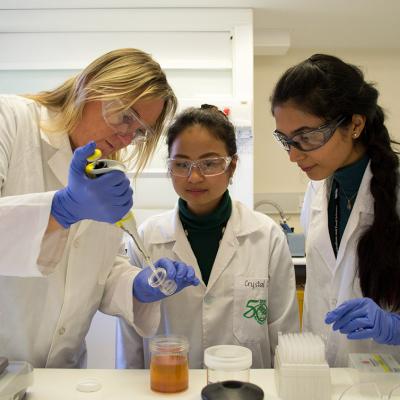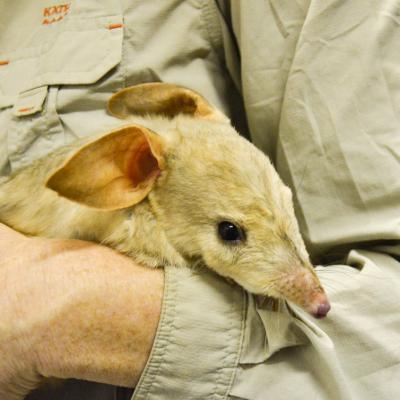The University of Queensland’s food science programs are multi-faceted, providing a plethora of opportunities for students to learn about the vital role food science plays to ensure food security and keep people healthy.
The global population’s exponential growth is putting pressure on food security. Diseases related to poor diet are on the rise.
Trends like these have created a heightened demand for experts in the food science, food technology and nutrition fields.
If you’re looking to kickstart a career in food science by studying at UQ, it’s important to learn about the many different paths you can take. To help with this decision, this explainer will show how each of UQ’s food science programs differ, with a focus on what career paths they’re most suited to and the kinds of food science courses you’ll complete in each.
Why should you get your food science degree at UQ?
UQ is currently ranked first in Australia for its food science programs. We’re also a key research provider in the food science and technology industries.
As a student of one of UQ’s food science degrees, you’ll be learning from some of the most acclaimed and passionate researchers in the world. You’ll graduate with the skills, knowledge and confidence to carve out a meaningful and successful career in one of Australia’s largest industries.
So, what food science programs are on the menu at UQ?
Bachelor of Science (Food Science and Nutrition major)
This program is dedicated to the study of food and its consumption. It would be a great fit for you if you’re interested in gaining a deep scientific insight into how the food system works, with a focus on:
- processing and distribution
- how food is selected and consumed
- how it affects your health
- human nutrition.
Is this the right food science degree for your career ambitions?
A Bachelor of Science with a Food Science and Nutrition major is ideal for anyone looking to begin a career as a nutritionist, dietitian, or nutrition adviser or scientist on a community and general population level.
Interested in forging a rewarding career as a researcher or academic? This program creates a great foundation for that, too.
A couple of the courses you’ll study in this program to reach your career goals include:
Nutrition science
In this course, you’ll get an in-depth look at nutrition biochemistry and what the human body requires to maintain optimal performance. You’ll also learn about how nutrition science is translated into dietary guidelines and how to discern between sound nutrition information and unfounded claims.
Understanding population nutrition
This course is designed to facilitate growth in students’ abilities to:
- design studies
- collect data
- develop methodologies and research tools
- report on their findings from a public health perspective.
You’ll be introduced to the varied methods available to community and public health nutritionists for describing the food and nutrition landscape of specific subsets of the population. Specifically, you’ll be introduced to dietary assessment tools, food security and infant feeding questionnaires, and qualitative approaches to developing an in-depth understanding of people’s attitudes and practices regarding nutrition and diet.
Learn more about the Bachelor of Science or the Food Science and Nutrition major.

Bachelor of Science (Food Technology major)
In this program, you’ll take a hands-on approach to learning about the scientific composition of foods and the chemical reactions that take place during processing. If you’re interested in learning about key aspects of the development of food products and developing your expertise in food preservation, processing operations, quality assurance and consumer product testing, this program is perfect for you.
Is this the right food science program for your career ambitions?
This program is designed for people looking to work in roles such as:
- food technologist
- quality systems coordinator
- research and development coordinator
- product development technologist.
It’s also a great steppingstone for a meaningful research and academic career.
Here are a couple of the courses you’ll study to help you on your way to a career in one of those roles:
Food product development
This food science course is a great introduction to the entrepreneurial and business side of food manufacturing and development. It provides a comprehensive look at the complex and interdisciplinary nature of introducing new food products into the marketplace.
You’ll learn about the importance of integrating marketing and consumer aspects with the technical aspects of food processing and production. The course also covers the various stages in product development, as well as the food regulations and approval procedure for new products.
Food process engineering (fundamentals and advanced)
In these courses, you’ll gain a fundamental and then advanced knowledge of the physical principles, associated calculations and basic equipment involved in food processing operations. You’ll learn how heat transfer and heat exchangers, thermodynamics, gases, vapours, steam and much more play an integral role in food-processing operations.
Learn more about the Bachelor of Science or the Food Technology major.

Master of Food Science and Technology
This program is designed to build your leadership, research and problem-solving skills in the food science and technology industry.
You’ll continue to grow your scientific and business knowledge of the food science industry through an extensive 14-week work placement. Plus, you’ll have access to world-class food science and technology research facilities with extensive laboratory practice at UQ’s Food Science Innovation Precinct.
Is this the right food science degree for your career ambitions?
Upon completion of this program, you’ll be qualified for several careers in the food science space, including:
- food microbiologist
- sustainable food production specialist
- agribusiness consultant
- food chemist.
This program is also a fantastic opportunity for people looking to become a dedicated researcher or academic in the food science industry.
These are some of the courses you’ll complete on your way:
Advanced food materials science
In this course, you’ll learn about food science from a variety of different angles, with principles applied from other disciplines such as polymer science and metallurgy. You’ll cover topics ranging from the nanostructure and nanotechnology of foods, to 3D food-printing technology. Using these approaches, you’ll be better equipped to examine the structure of foods and explain why food materials behave as they do in the processing stages.
Professional experience
As part of this food science program, you’ll gain 400-480 hours of hands-on industry experience through a work-integrated learning placement at some of the nation’s biggest food-manufacturing companies. Using all the knowledge and skills developed throughout this master’s program, you’ll have the chance to work on real-world projects while gaining access to invaluable industry contacts and an insight into industry operations in the food science field.
Learn more about the Master of Food Science and Technology.






